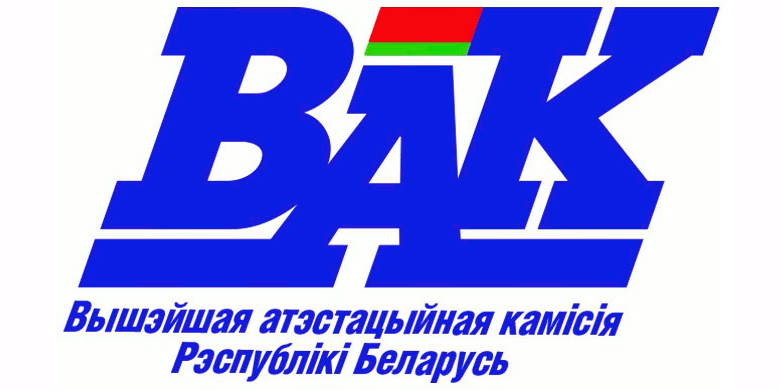The German Question in the Period of Interim Settlement (1970–1972): the Problem Analyses in British and American Historiography
Keywords:
British and American historiography, conservatism, rationalism, liberalism, German question, Moscow Treaty, Quadripartite Agreement on Berlin, Basic TreatyAbstract
The main stages of the Anglo-American historiography of the German question during its interim settlement identified. The reasons for the qualitative changes in evaluations of the German question in 1970–1972 at each of the stages stated. The main approaches to the study of the problem analyzed taking into account the change in their relevance during the 1970s–2000s.
References
1. Sodaro, M.J. Moscow, Germany and the West from Khrushchev to Gorbachev / M.J. Sodaro. – Ithaca; London : Cornell University, 1990. – 423 p.
2. Banchoff, T. The German problem transformed: institutions, politics and foreign policy, 1945–1995 / T. Banchoff. – Michigan : The University of Michigan, 1999. – 230 p.
3. Hughes, G. Britain, Germany and the cold war. The search for European détente, 1949–1967 / G. Hughes. – London ; New York : Routledge, 2007. – 253 р.
4. Pittman, A. From Ostpolitik to reunification: West German – Soviet political relations since 1974 / A. Pittman. – New York : Cambridge University Press, 1992. – 226 p.
5. Smyser, W. From Yalta to Berlin: The cold war struggle over Germany / W. Smyser. – New York : St. Martin’s Griffin, 1999. – 465 p.
6. Balfour, M. West Germany / M. Balfour. – New York : Praeger, 1968. – 344 p.
7. Johnes, W.T. Germany: prospects for a nationalist revival / W.T. Johnes // International Affairs. – 1970. – Vol. 46. – N 2. – P. 316-322.
8. McCauley, M. Marxism-Leninism in the German Democratic Republic / M. McCauley. – London : Macmillan, 1979. – 267 p.
9. Griffith, W. The American view / W. Griffith // Germany between East and West / Ed. by E. Moreton. – Cambridge : Cambridge University Press, 1989. – P. 49–63.
10. Edinger, J.L. Politics in Germany. Attitudes and processes / L.J. Edinger. – Boston : Little, Brown and Co., 1968. – 360 p.
11. Roberts, G. West German politics / G. Roberts. – New York : Taplinger Publishing Company, 1972. – 206 p.
12. Сrawley, A. The rise of Western Germany, 1945–1972 / A. Crawley. – London : Collins, 1973. – 315 p.
13. Albert, E.H. Bonn’s Moscow Treaty and its implications source / E.H. Albert // International Affairs. – 1971. – Vol. 47. – N 2. – P. 316-326. – Mode of access: https://www.jstor.org/stable/2613931. – Date of access: 29.01.2019.
14. Pierre, A. The Bonn–Moscow Treaty of 1970: Milestone or Mirage? / A. Pierre // The Russian Review. – 1971. – Vol. 30. – N 1. ¬– P. 17-26. – Mode of access: http://www.jstor.org/stable/127471. – Date of access: 04.07.2018.
15. Morgan, R. 54: West Germany’s foreign policy agenda / R. Morgan // The Washington papers. – London : Sage, 1978. – 79 p.
16. Hanrieder, W.F., Graeme, P.A. The foreign policies of West Germany, France and Britain / W. Hanrieder, A. Graeme. – Englewood Cliffs : Prentice-Hall, 1980. – 314 p.
17. Clemens, W.C. The Soviet world faces West: 1945–1970 / W.C. Clemens // International Affairs. – 1970. – Vol. 46. – N 3. – P. 475–489.
18. Kennan, G.F. Europe’s Problems, Europe’s Choices / G.F. Kennan // Foreign Policy. – 1974. – N 14. – P. 3–16. – Mode of access: https://www.jstor.org/stable/1147941. – Date of access : 23.09.2018.
19. Morgan, R. The United States and West Germany, 1945–1973. A study in Alliance politics / R. Morgan. – London : Oxford University, 1974. – 282 p.
20. Livingston, R.G. East Germany between Moscow and Bonn / R.G. Livingston // Foreign Affairs. – 1972. – Vol. 50. – N 2. – P. 297-309. – Mode of access: https://www.jstor.org/stable/20037907. – Date of access: 29.01.2019.
21. Sowden, J.K. The German question, 1945–1973. Continuity in change / J.K. Sowden. – London : Bradford University, 1975. – 404 p.
22. Catudal, H.M. The Berlin Agreement of 1971: Has it worked? / H.M. Catudal // The International and Comparative Law Quarterly. – 1976. – Vol. 25. – N 4. – P. 766-800. – Mode of access: https://www.jstor.org/stable/758524. – Date of access: 29.01.2019.
23. Catudal, H.M. The diplomacy of the Quadripartite Agreement on Berlin: A new era in East–West politics / H.M. Catudal. – Berlin : Berlin Verlag, 1977. – 335 p.
24. Catudal, H.M. Problems and perspectives of the current Berlin settlement / H.M. Catudal // GeoJournal. – 1978. – Vol. 2. – N 1. – P. 5-9. – Mode of access: https://www.jstor.org/stable/41142064. – Date of access: 29.01.2019.
25. Dean, J. The future of Berlin / J. Dean // Germany between East and West / Ed. By E. Moreton. – Cambridge : Cambridge University Press, 1989. – P. 157–179.
26. McAdams, A.J. Explaining inter-German cooperation in the 1980s / A.J. McAdams // German Studies Review. – 1990. – Vol. 13. DAAD Special Issue. – P. 99-114. – Mode of access: https://www.jstor.org/stable/1431041. – Date of access: 29.01.2019.
27. Larrabee, F.S. Relations between the two German states: problems and prospects / F.S. Larrabee // German Studies Newsletter. – 1985. – N 6. Special Issue on Security. – P. 13-16. – Mode of access: https://www.jstor.org/stable/23733848. – Date of access: 29.01.2019.
28. McAdams, A.J. East Germany and détente. Building authority after the Wall / A. J. McAdams. – Cambridge : Cambridge University Press, 1985. – 233 p.
29. Morgan, R., Bray, C. Berlin in the post-détente era / R. Morgan, C. Bray // The World Today. – 1982. – Vol. 38. – N 3. – P. 81-89. – Mode of access: https://www.jstor.org/stable/40395365. – Date of access: 29.01.2019.
30. Munro, C. Britain and German Ostpolitik / C. Munro // Deutschland und Russland in der britischen Kontinentalpolitik seit 1815 / Hsg. von A.M. Birke und H. Wentker. – Muenchen ; New Providence ; London ; Paris : Saur, 1994. – P. 145–155.
31. Rynhold, J. The German question in Central and Eastern Europe and the long peace in Europe after 1945: an integrated theoretical explanation / J. Rynhold // Review of International Studies. – 2011. – Vol. 37. – N 1. – P. 249–275.
32. Armstrong, T. Breaking the ice: rapprochement between East and West Germany, the United States and China, and Israel and Egypt / T. Armstrong. – Washington : United States Institute of Peace Press, 1993. – 187 p.
33. Fulbrook, M. The two Germanies, 1945–1990. Problems of interpretation / M. Fulbrook. – London : Macmillan, 1992. – 114 p.
34. Stent, A. Russia and Germany reborn: unification, the Soviet collapse and the new Europe / A. Stent. – Princeton : Princeton University, 1999. – 300 р.
35. Judt, T. Postwar. A history of Europe since 1945 / T. Judt. – New York : Penguin Press, 2005. – 967 p.
36. Croan, M. Germany and Eastern Europe / M. Croan // The Columbia history of Eastern Europe in the twentieth century. – New York : Columbia University, 1992. – P. 345-393.
37. Selvage, D.E. Transforming the Soviet Sphere of Influence? U.S.–Soviet détente and Eastern Europe, 1969–1976 / D.E. Selvage // Diplomatic History. – 2009. – Vol. 33. – N 4. – P. 671-687. – Mode of access: https://www.jstor.org/stable/44214075. – Date of access: 05.08.2018.
38. Grady, T. A shared environment: German-German relations along the border, 1945–72 / T. Grady // Journal of Contemporary History. – 2015. – Vol. 50. – N 3. – P. 660-679. – Mode of access: https://www.jstor.org/stable/43697395. – Date of access: 29.01.2019.
References
1. Sodaro M.J. Moscow, Germany and the West from Khrushchev to Gorbachev. Ithaca; London, Cornell University, 1990, 423 p.
2. Banchoff, T. The German problem transformed: institutions, politics and foreign policy, 1945–1995. Michigan, The University of Michigan, 1999, 230 p.
3. Hughes G. Britain, Germany and the cold war. The search for European détente, 1949 – 1967. London; New York, Routledge, 2007, 253 р.
4. Pittman A. From Ostpolitik to reunification: West German – Soviet political relations since 1974. New York, Cambridge University Press, 1992, 226 p.
5. Smyser W. From Yalta to Berlin: The cold war struggle over Germany. New York, St. Martin’s Griffin, 1999, 465 p.
6. Balfour M. West Germany. New York, Praeger, 1968, 344 p.
7. Johnes W.T. Germany: prospects for a nationalist revival. International Affairs, 1970, vol. 46, no. 2, pp. 316-322
8. McCauley M. Marxism-Leninism in the German Democratic Republic. London, Macmillan, 1979, 267 p.
9. Griffith W. The American view. Germany between East and West. Cambridge, Cambridge University Press, 1989, pp. 49-63
10. Edinger J.L. Politics in Germany. Attitudes and processes. Boston, Little, Brown and Co., 1968, 360 p.
11. Roberts G. West German politics. New York, Taplinger Publishing Company, 1972, 206 p.
12. Сrawley A. The rise of Western Germany, 1945–1972. London, Collins, 1973, 315 p.
13. Albert E.H. Bonn’s Moscow Treaty and its implications source. International Affairs, 1971, vol. 47, no. 2, pp. 316-326. Available at: https://www.jstor.org/stable/2613931 (accessed 29.01.2019)
14. Pierre A. The Bonn–Moscow Treaty of 1970: Milestone or Mirage? The Russian Review, 1971, vol. 30, no. 1, pp. 17-26. Available at: http://www.jstor.org/stable/127471 (accessed 04.07.2018)
15. Morgan R. 54: West Germany’s foreign policy agenda. The Washington papers. London, Sage, 1978, 79 p.
16. Hanrieder W.F., Graeme P.A. The foreign policies of West Germany, France and Britain. Englewood Cliffs, Prentice-Hall, 1980, 314 p.
17. Clemens W.C. The Soviet world faces West: 1945–1970. International Affairs, 1970, vol. 46, no. 3, pp. 475-489
18. Kennan G.F. Europe’s Problems, Europe’s Choices. Foreign Policy, 1974, no. 14, pp. 3-16. Available at: https://www.jstor.org/stable/1147941 (accessed 23.09.2018)
19. Morgan R. The United States and West Germany, 1945–1973. A study in Alliance politics. London, Oxford University, 1974, 282 p.
20. Livingston R.G. East Germany between Moscow and Bonn. Foreign Affairs, 1972, vol. 50, no. 2, pp. 297-309. Available at: https://www.jstor.org/stable/20037907 (accessed 29.01.2019)
21. Sowden J.K. The German question, 1945–1973. Continuity in change. London, Bradford University, 1975. 404 p.
22. Catudal H.M. The Berlin Agreement of 1971: Has it worked? The International and Comparative Law Quarterly, 1976, vol. 25, no. 4, pp. 766-800. Available at: https://www.jstor.org/stable/758524 (accessed: 29.01.2019)
23. Catudal H.M. The diplomacy of the Quadripartite Agreement on Berlin: A new era in East–West politics. Berlin, Berlin Verlag, 1977, 335 p.
24. Catudal H.M. Problems and perspectives of the current Berlin settlement. GeoJournal, 1978, vol. 2, no. 1, pp. 5-9. Available at: https://www.jstor.org/stable/41142064 (accessed 29.01.2019)
25. Dean J. The future of Berlin. Germany between East and West. Cambridge, Cambridge University Press, 1989, pp. 157-179
26. McAdams A.J. Explaining inter-German cooperation in the 1980s. German Studies Review, 1990, vol. 13, DAAD Special Issue, pp. 99-114. Available at: https://www.jstor.org/stable/1431041 (accessed 29.01.2019)
27. Larrabee F.S. Relations between the two German states: problems and prospects. German Studies Newsletter, 1985, no. 6, pp.13-16. Available at: https://www.jstor.org/stable/23733848 (accessed 29.01.2019)
28. McAdams A.J. East Germany and détente. Building authority after the Wall. Cambridge, Cambridge University Press, 1985, 233 p.
29. Morgan R., Bray, C. Berlin in the post-détente era. The World Today, 1982, vol. 38, no. 3, pp. 81-89. Available at: https://www.jstor.org/stable/40395365 (accessed 29.01.2019)
30. Munro C. Britain and German Ostpolitik. Deutschland und Russland in der britischen Kontinentalpolitik seit 1815. Muenchen, New Providence; London; Paris, Saur, 1994, pp. 145-155
31. Rynhold J. The German question in Central and Eastern Europe and the long peace in Europe after 1945: an integrated theoretical explanation. Review of International Studies, 2011, vol. 37, no. 1, pp. 249-275
32. Armstrong T. Breaking the ice: rapprochement between East and West Germany, the United States and China, and Israel and Egypt. Washington, United States Institute of Peace Press, 1993, 187 p.
33. Fulbrook M. The two Germanies, 1945–1990. Problems of interpretation. London, Macmillan, 1992, 114 p.
34. Stent A. Russia and Germany reborn: unification, the Soviet collapse and the new Europe. Princeton, Princeton University, 1999, 300 р.
35. Judt T. Postwar. A history of Europe since 1945. New York, Penguin Press, 2005, 967 p.
36. Croan M. Germany and Eastern Europe. The Columbia history of Eastern Europe in the twentieth century. New York, Columbia University, 1992, pp. 345-393
37. Selvage D.E. Transforming the Soviet Sphere of Influence? U.S.–Soviet détente and Eastern Europe, 1969–1976. Diplomatic History, 2009, vol. 33, no. 4, pp. 671-687. Available at: https://www.jstor.org/stable/44214075 (accessed 05.08.2018)
38. Grady T. A shared environment: German-German relations along the border, 1945–72. Journal of Contemporary History, 2015, vol. 50, no. 3, pp. 660-679. Available at: https://www.jstor.org/stable/43697395 (accessed 29.01.2019).
2. Banchoff, T. The German problem transformed: institutions, politics and foreign policy, 1945–1995 / T. Banchoff. – Michigan : The University of Michigan, 1999. – 230 p.
3. Hughes, G. Britain, Germany and the cold war. The search for European détente, 1949–1967 / G. Hughes. – London ; New York : Routledge, 2007. – 253 р.
4. Pittman, A. From Ostpolitik to reunification: West German – Soviet political relations since 1974 / A. Pittman. – New York : Cambridge University Press, 1992. – 226 p.
5. Smyser, W. From Yalta to Berlin: The cold war struggle over Germany / W. Smyser. – New York : St. Martin’s Griffin, 1999. – 465 p.
6. Balfour, M. West Germany / M. Balfour. – New York : Praeger, 1968. – 344 p.
7. Johnes, W.T. Germany: prospects for a nationalist revival / W.T. Johnes // International Affairs. – 1970. – Vol. 46. – N 2. – P. 316-322.
8. McCauley, M. Marxism-Leninism in the German Democratic Republic / M. McCauley. – London : Macmillan, 1979. – 267 p.
9. Griffith, W. The American view / W. Griffith // Germany between East and West / Ed. by E. Moreton. – Cambridge : Cambridge University Press, 1989. – P. 49–63.
10. Edinger, J.L. Politics in Germany. Attitudes and processes / L.J. Edinger. – Boston : Little, Brown and Co., 1968. – 360 p.
11. Roberts, G. West German politics / G. Roberts. – New York : Taplinger Publishing Company, 1972. – 206 p.
12. Сrawley, A. The rise of Western Germany, 1945–1972 / A. Crawley. – London : Collins, 1973. – 315 p.
13. Albert, E.H. Bonn’s Moscow Treaty and its implications source / E.H. Albert // International Affairs. – 1971. – Vol. 47. – N 2. – P. 316-326. – Mode of access: https://www.jstor.org/stable/2613931. – Date of access: 29.01.2019.
14. Pierre, A. The Bonn–Moscow Treaty of 1970: Milestone or Mirage? / A. Pierre // The Russian Review. – 1971. – Vol. 30. – N 1. ¬– P. 17-26. – Mode of access: http://www.jstor.org/stable/127471. – Date of access: 04.07.2018.
15. Morgan, R. 54: West Germany’s foreign policy agenda / R. Morgan // The Washington papers. – London : Sage, 1978. – 79 p.
16. Hanrieder, W.F., Graeme, P.A. The foreign policies of West Germany, France and Britain / W. Hanrieder, A. Graeme. – Englewood Cliffs : Prentice-Hall, 1980. – 314 p.
17. Clemens, W.C. The Soviet world faces West: 1945–1970 / W.C. Clemens // International Affairs. – 1970. – Vol. 46. – N 3. – P. 475–489.
18. Kennan, G.F. Europe’s Problems, Europe’s Choices / G.F. Kennan // Foreign Policy. – 1974. – N 14. – P. 3–16. – Mode of access: https://www.jstor.org/stable/1147941. – Date of access : 23.09.2018.
19. Morgan, R. The United States and West Germany, 1945–1973. A study in Alliance politics / R. Morgan. – London : Oxford University, 1974. – 282 p.
20. Livingston, R.G. East Germany between Moscow and Bonn / R.G. Livingston // Foreign Affairs. – 1972. – Vol. 50. – N 2. – P. 297-309. – Mode of access: https://www.jstor.org/stable/20037907. – Date of access: 29.01.2019.
21. Sowden, J.K. The German question, 1945–1973. Continuity in change / J.K. Sowden. – London : Bradford University, 1975. – 404 p.
22. Catudal, H.M. The Berlin Agreement of 1971: Has it worked? / H.M. Catudal // The International and Comparative Law Quarterly. – 1976. – Vol. 25. – N 4. – P. 766-800. – Mode of access: https://www.jstor.org/stable/758524. – Date of access: 29.01.2019.
23. Catudal, H.M. The diplomacy of the Quadripartite Agreement on Berlin: A new era in East–West politics / H.M. Catudal. – Berlin : Berlin Verlag, 1977. – 335 p.
24. Catudal, H.M. Problems and perspectives of the current Berlin settlement / H.M. Catudal // GeoJournal. – 1978. – Vol. 2. – N 1. – P. 5-9. – Mode of access: https://www.jstor.org/stable/41142064. – Date of access: 29.01.2019.
25. Dean, J. The future of Berlin / J. Dean // Germany between East and West / Ed. By E. Moreton. – Cambridge : Cambridge University Press, 1989. – P. 157–179.
26. McAdams, A.J. Explaining inter-German cooperation in the 1980s / A.J. McAdams // German Studies Review. – 1990. – Vol. 13. DAAD Special Issue. – P. 99-114. – Mode of access: https://www.jstor.org/stable/1431041. – Date of access: 29.01.2019.
27. Larrabee, F.S. Relations between the two German states: problems and prospects / F.S. Larrabee // German Studies Newsletter. – 1985. – N 6. Special Issue on Security. – P. 13-16. – Mode of access: https://www.jstor.org/stable/23733848. – Date of access: 29.01.2019.
28. McAdams, A.J. East Germany and détente. Building authority after the Wall / A. J. McAdams. – Cambridge : Cambridge University Press, 1985. – 233 p.
29. Morgan, R., Bray, C. Berlin in the post-détente era / R. Morgan, C. Bray // The World Today. – 1982. – Vol. 38. – N 3. – P. 81-89. – Mode of access: https://www.jstor.org/stable/40395365. – Date of access: 29.01.2019.
30. Munro, C. Britain and German Ostpolitik / C. Munro // Deutschland und Russland in der britischen Kontinentalpolitik seit 1815 / Hsg. von A.M. Birke und H. Wentker. – Muenchen ; New Providence ; London ; Paris : Saur, 1994. – P. 145–155.
31. Rynhold, J. The German question in Central and Eastern Europe and the long peace in Europe after 1945: an integrated theoretical explanation / J. Rynhold // Review of International Studies. – 2011. – Vol. 37. – N 1. – P. 249–275.
32. Armstrong, T. Breaking the ice: rapprochement between East and West Germany, the United States and China, and Israel and Egypt / T. Armstrong. – Washington : United States Institute of Peace Press, 1993. – 187 p.
33. Fulbrook, M. The two Germanies, 1945–1990. Problems of interpretation / M. Fulbrook. – London : Macmillan, 1992. – 114 p.
34. Stent, A. Russia and Germany reborn: unification, the Soviet collapse and the new Europe / A. Stent. – Princeton : Princeton University, 1999. – 300 р.
35. Judt, T. Postwar. A history of Europe since 1945 / T. Judt. – New York : Penguin Press, 2005. – 967 p.
36. Croan, M. Germany and Eastern Europe / M. Croan // The Columbia history of Eastern Europe in the twentieth century. – New York : Columbia University, 1992. – P. 345-393.
37. Selvage, D.E. Transforming the Soviet Sphere of Influence? U.S.–Soviet détente and Eastern Europe, 1969–1976 / D.E. Selvage // Diplomatic History. – 2009. – Vol. 33. – N 4. – P. 671-687. – Mode of access: https://www.jstor.org/stable/44214075. – Date of access: 05.08.2018.
38. Grady, T. A shared environment: German-German relations along the border, 1945–72 / T. Grady // Journal of Contemporary History. – 2015. – Vol. 50. – N 3. – P. 660-679. – Mode of access: https://www.jstor.org/stable/43697395. – Date of access: 29.01.2019.
References
1. Sodaro M.J. Moscow, Germany and the West from Khrushchev to Gorbachev. Ithaca; London, Cornell University, 1990, 423 p.
2. Banchoff, T. The German problem transformed: institutions, politics and foreign policy, 1945–1995. Michigan, The University of Michigan, 1999, 230 p.
3. Hughes G. Britain, Germany and the cold war. The search for European détente, 1949 – 1967. London; New York, Routledge, 2007, 253 р.
4. Pittman A. From Ostpolitik to reunification: West German – Soviet political relations since 1974. New York, Cambridge University Press, 1992, 226 p.
5. Smyser W. From Yalta to Berlin: The cold war struggle over Germany. New York, St. Martin’s Griffin, 1999, 465 p.
6. Balfour M. West Germany. New York, Praeger, 1968, 344 p.
7. Johnes W.T. Germany: prospects for a nationalist revival. International Affairs, 1970, vol. 46, no. 2, pp. 316-322
8. McCauley M. Marxism-Leninism in the German Democratic Republic. London, Macmillan, 1979, 267 p.
9. Griffith W. The American view. Germany between East and West. Cambridge, Cambridge University Press, 1989, pp. 49-63
10. Edinger J.L. Politics in Germany. Attitudes and processes. Boston, Little, Brown and Co., 1968, 360 p.
11. Roberts G. West German politics. New York, Taplinger Publishing Company, 1972, 206 p.
12. Сrawley A. The rise of Western Germany, 1945–1972. London, Collins, 1973, 315 p.
13. Albert E.H. Bonn’s Moscow Treaty and its implications source. International Affairs, 1971, vol. 47, no. 2, pp. 316-326. Available at: https://www.jstor.org/stable/2613931 (accessed 29.01.2019)
14. Pierre A. The Bonn–Moscow Treaty of 1970: Milestone or Mirage? The Russian Review, 1971, vol. 30, no. 1, pp. 17-26. Available at: http://www.jstor.org/stable/127471 (accessed 04.07.2018)
15. Morgan R. 54: West Germany’s foreign policy agenda. The Washington papers. London, Sage, 1978, 79 p.
16. Hanrieder W.F., Graeme P.A. The foreign policies of West Germany, France and Britain. Englewood Cliffs, Prentice-Hall, 1980, 314 p.
17. Clemens W.C. The Soviet world faces West: 1945–1970. International Affairs, 1970, vol. 46, no. 3, pp. 475-489
18. Kennan G.F. Europe’s Problems, Europe’s Choices. Foreign Policy, 1974, no. 14, pp. 3-16. Available at: https://www.jstor.org/stable/1147941 (accessed 23.09.2018)
19. Morgan R. The United States and West Germany, 1945–1973. A study in Alliance politics. London, Oxford University, 1974, 282 p.
20. Livingston R.G. East Germany between Moscow and Bonn. Foreign Affairs, 1972, vol. 50, no. 2, pp. 297-309. Available at: https://www.jstor.org/stable/20037907 (accessed 29.01.2019)
21. Sowden J.K. The German question, 1945–1973. Continuity in change. London, Bradford University, 1975. 404 p.
22. Catudal H.M. The Berlin Agreement of 1971: Has it worked? The International and Comparative Law Quarterly, 1976, vol. 25, no. 4, pp. 766-800. Available at: https://www.jstor.org/stable/758524 (accessed: 29.01.2019)
23. Catudal H.M. The diplomacy of the Quadripartite Agreement on Berlin: A new era in East–West politics. Berlin, Berlin Verlag, 1977, 335 p.
24. Catudal H.M. Problems and perspectives of the current Berlin settlement. GeoJournal, 1978, vol. 2, no. 1, pp. 5-9. Available at: https://www.jstor.org/stable/41142064 (accessed 29.01.2019)
25. Dean J. The future of Berlin. Germany between East and West. Cambridge, Cambridge University Press, 1989, pp. 157-179
26. McAdams A.J. Explaining inter-German cooperation in the 1980s. German Studies Review, 1990, vol. 13, DAAD Special Issue, pp. 99-114. Available at: https://www.jstor.org/stable/1431041 (accessed 29.01.2019)
27. Larrabee F.S. Relations between the two German states: problems and prospects. German Studies Newsletter, 1985, no. 6, pp.13-16. Available at: https://www.jstor.org/stable/23733848 (accessed 29.01.2019)
28. McAdams A.J. East Germany and détente. Building authority after the Wall. Cambridge, Cambridge University Press, 1985, 233 p.
29. Morgan R., Bray, C. Berlin in the post-détente era. The World Today, 1982, vol. 38, no. 3, pp. 81-89. Available at: https://www.jstor.org/stable/40395365 (accessed 29.01.2019)
30. Munro C. Britain and German Ostpolitik. Deutschland und Russland in der britischen Kontinentalpolitik seit 1815. Muenchen, New Providence; London; Paris, Saur, 1994, pp. 145-155
31. Rynhold J. The German question in Central and Eastern Europe and the long peace in Europe after 1945: an integrated theoretical explanation. Review of International Studies, 2011, vol. 37, no. 1, pp. 249-275
32. Armstrong T. Breaking the ice: rapprochement between East and West Germany, the United States and China, and Israel and Egypt. Washington, United States Institute of Peace Press, 1993, 187 p.
33. Fulbrook M. The two Germanies, 1945–1990. Problems of interpretation. London, Macmillan, 1992, 114 p.
34. Stent A. Russia and Germany reborn: unification, the Soviet collapse and the new Europe. Princeton, Princeton University, 1999, 300 р.
35. Judt T. Postwar. A history of Europe since 1945. New York, Penguin Press, 2005, 967 p.
36. Croan M. Germany and Eastern Europe. The Columbia history of Eastern Europe in the twentieth century. New York, Columbia University, 1992, pp. 345-393
37. Selvage D.E. Transforming the Soviet Sphere of Influence? U.S.–Soviet détente and Eastern Europe, 1969–1976. Diplomatic History, 2009, vol. 33, no. 4, pp. 671-687. Available at: https://www.jstor.org/stable/44214075 (accessed 05.08.2018)
38. Grady T. A shared environment: German-German relations along the border, 1945–72. Journal of Contemporary History, 2015, vol. 50, no. 3, pp. 660-679. Available at: https://www.jstor.org/stable/43697395 (accessed 29.01.2019).













